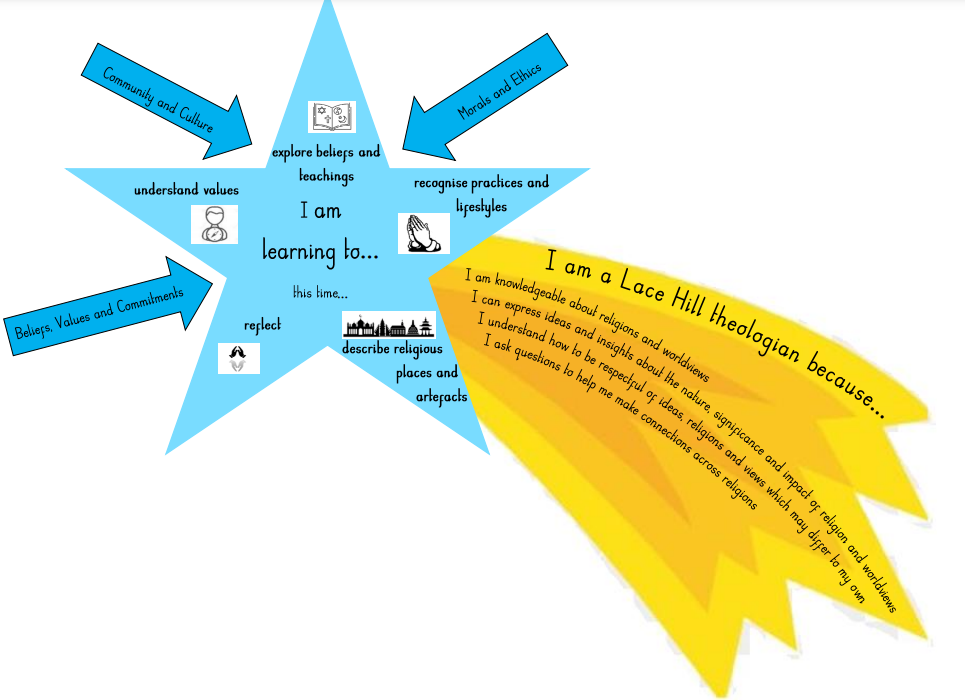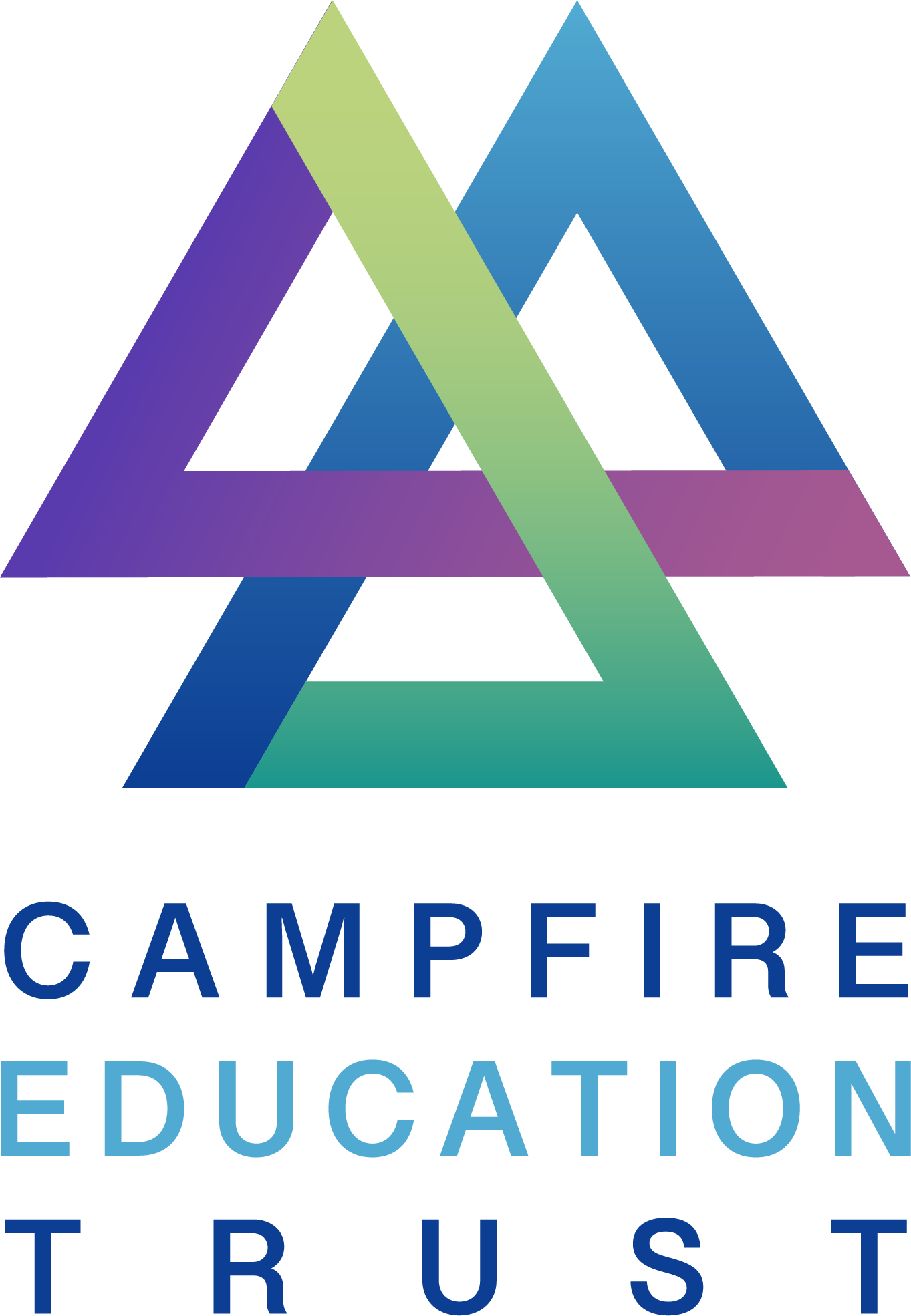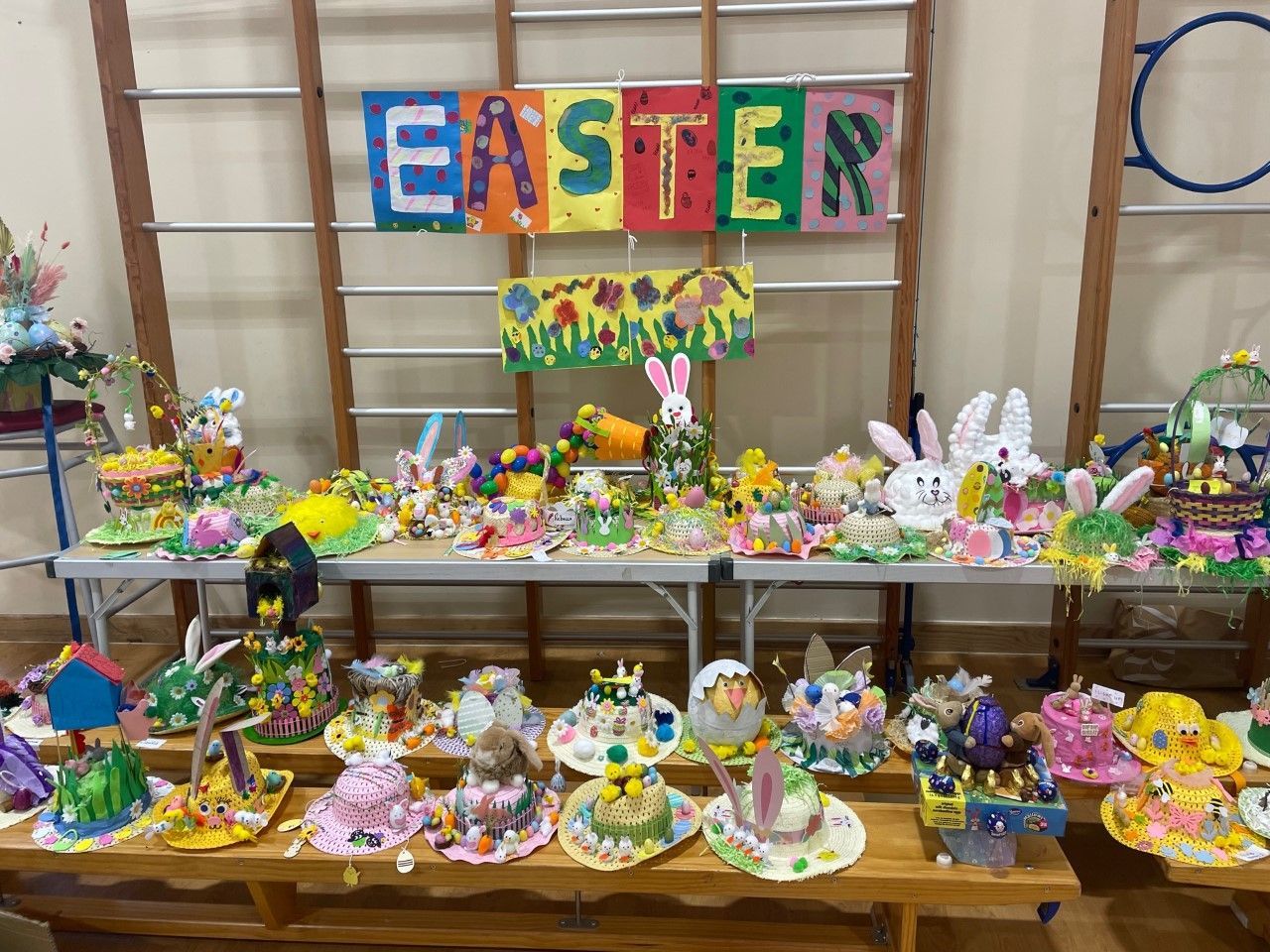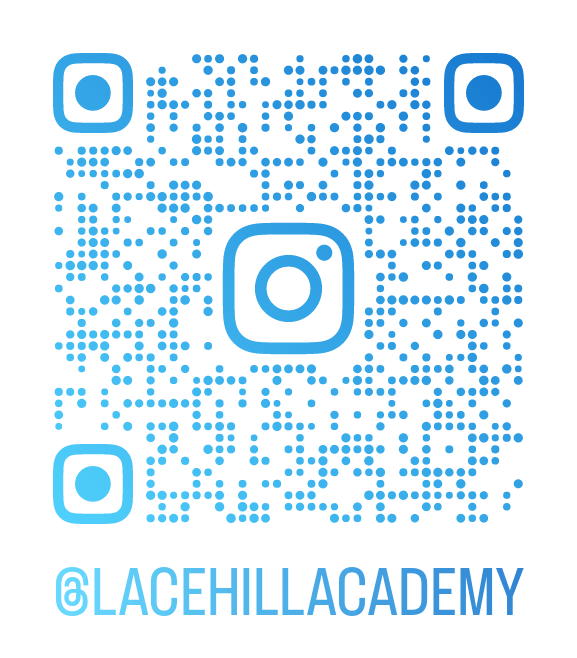Religious Education
Intent
There are two main educational purposes to RE:
- Pupils can learn about religions and beliefs which have influenced the lives of millions of people and heavily influenced the development of different human cultures. This enables our pupils to understand the modern world.
- Pupils can reflect more deeply on their own and others’ sense of identity, meaning and purpose in life from their study of religion and belief. This develops our pupils' understanding of human values and mutual understanding.
Religious education within our school gives students valuable insights into the diverse beliefs & opinions held by people today. It helps with their own personal development & supports an understanding of the spiritual, moral, social & cultural questions that surface again & again in their lives.
We hold links with a local Christian church, enjoying visits at Easter and Christmas as well as welcoming members of the church into our assemblies throughout the year. Religious festivals, such as Diwali, are celebrated with the generous support of parents who understand the value of first-hand experience to enrich the learning for our children.
It our intent that children will leave Lace Hill Academy prepared for the wider world, and that they are equipped with a strong sense of right and wrong to support them in being better informed citizens. We want our pupils to be able to understand our constantly changing world, and to be able to interpret religious issues and evaluate their significance. We break this down into the key knowledge needed, and how we can make it meaningful and bring it to life for them in the hope they will then have the confidence to ask questions and make connections across faiths.
‘Knowing it’
Equipping children with the core knowledge and understanding of texts, stories and key beliefs.
‘Living it’
Providing opportunities for practice and participation in faith communities: diversity of beliefs in actions personally, locally and globally.
‘Linking it’
Encouraging comparing and contrasting, evaluation and appraising and making connections to their own and others’ lives.
Our RE curriculum is designed around three substantive concepts (shown in the arrows pointing towards the star):
- Beliefs, values and commitments
- Community and culture
- Morals and ethics
Through our RE curriculum, children are also exposed to the following disciplinary concepts (shown in the points of the star):
- Exploring beliefs and teachings
- Understanding values
- Recognising practices and lifestyles
- Reflection
- Exploring beliefs and teachings
This is how our children learn to be Lace Hill theologians and achieve our intent below (also shown in the golden tail):
I am Lace Hill theologian because…
- I am knowledgeable about religions and worldviews.
- I can express ideas and insights about the nature, significance and impact of religion and worldviews.
- I understand how to be respectful of ideas, religions and views which may differ to my own.
- I ask questions to help me make connections across religions.

Implementation
At Lace Hill Academy, we follow the Oxford Diocese scheme of work for Religious Education. It organises learning into half-termly themes, each one revisiting multiple faiths, rather than simply focusing on one religion at a time. We believe in the importance of encountering concepts more than once to allow time for knowledge to develop and progress. Religious Education is not just taught in discrete lessons. The children’s knowledge and understanding is enriched through a planned programme of cultural and religious assemblies, where they are exposed to the beliefs and traditions of other cultures in the community. It is also supported by our PHSE programme which further promotes the children’s spiritual, moral, social and cultural development.
Lessons offer a structured and safe space for reflection, discussion, dialogue and debate, where pupils feel free to ask questions and share their own beliefs and world views with the confidence to do so. Lessons will cover, where appropriate and relevant, current events of a religious, moral or philosophical nature, whether local, national or global.
Impact
At Lace Hill Academy, our aim for our RE curriculum is to enable our children to have a good knowledge of world religions and views. They will be able to express ideas and insights as well as ask questions to help them make connections across religions. Our curriculum ensures that our children are respectful of ideas, religions and views that may differ from their own. They will demonstrate the value of tolerance which will support their journey into Key Stage 3. We measure the impact of our RE curriculum through monitoring work in books, pupil voice, by taking learning walks and termly data analysis.
List of services
-
Why is Religious Education at Lace Hill Academy so important?List Item 1
- It helps pupils understand the world they live in by developing their religious literacy
- It helps them to develop skills in recognising, handling and analysing the big questions and concepts that arise from experience and help make sense of life
- It provides opportunities for and develops their ability to reflect on experience
- It develops debating, reasoning, self-expression, relationships and self-understanding
- It helps with their literacy, creativity, personal development and critical thinking
- It helps their understanding of identity and their search for meaning, purpose and value
- Helps pupils deal with controversy and learning to disagree whilst living together in community
- Understand and respectfully challenge and be challenged by people of different lifestyles, beliefs and practices
-
How are my child’s skills developed?List Item 2
Early Years Foundation Stage
Pupils learn about different religious festivals throughout the year which develop their knowledge and understanding of religious beliefs. Festivals include Diwali, Eid, Hanukkah, Christmas, Chinese New year and Easter.
Pupils develop their understanding of different cultures through circle time, role-play, artefacts, stories, show and tell, food, art and music.
Pupils develop their thinking and questioning skills across the EYFS curriculum.
Key Stage 1
Pupils explore Christianity and Judaism in some depth
Pupils explore non-religious views held by members of the class and their families.
Pupils learn to use basic subject specific vocabulary.
Pupils raise questions and begin to express their own views in response to the material they learn about and in response to questions about their ideas.
Key Stage 2
Pupils learn about Christianity, Hinduism and Islam
They extend their knowledge and understanding of religions and worldviews, recognising their local, national and global contexts.
They are encouraged to be curious and to ask increasingly challenging questions about religion, belief, values and human life.
Pupils make connections between differing aspects of religion and consider the different forms of religious expression.
They consider the beliefs, teachings, practices and ways of life central to religion.
Pupils learn about sacred texts and other sources and consider their meanings.
They begin to recognise diversity in religion, learning about similarities and differences within as well as between religions and beliefs and the importance of mutual understanding.
They recognise the challenges involved in distinguishing between ideas of right and wrong, and valuing what is good and true.
Pupils learn to express their own ideas in response to the material they engage with; identifying relevant information, selecting examples and giving reasons to support their ideas and views.
At Lace Hill Academy, Religious Education (RE) is an important part of our curriculum and helps children learn about different beliefs, values, and traditions. It supports pupils in developing respect and understanding for others and prepares them for life in a diverse world.
In line with the law and Department for Education (DfE) guidance, parents and carers have the right to withdraw their child from all or part of RE. If you are considering this, we encourage you to first discuss your concerns with the Head of School so that we can explain the aims of our RE curriculum and answer any questions you may have.
While we respect the right to withdraw, we strongly encourage all children to take part in RE as it is a valuable opportunity to explore and reflect on different beliefs and worldviews, and to develop mutual respect and tolerance.
If, after discussion, you still wish to withdraw your child, please put your request in writing to the Head of School.






